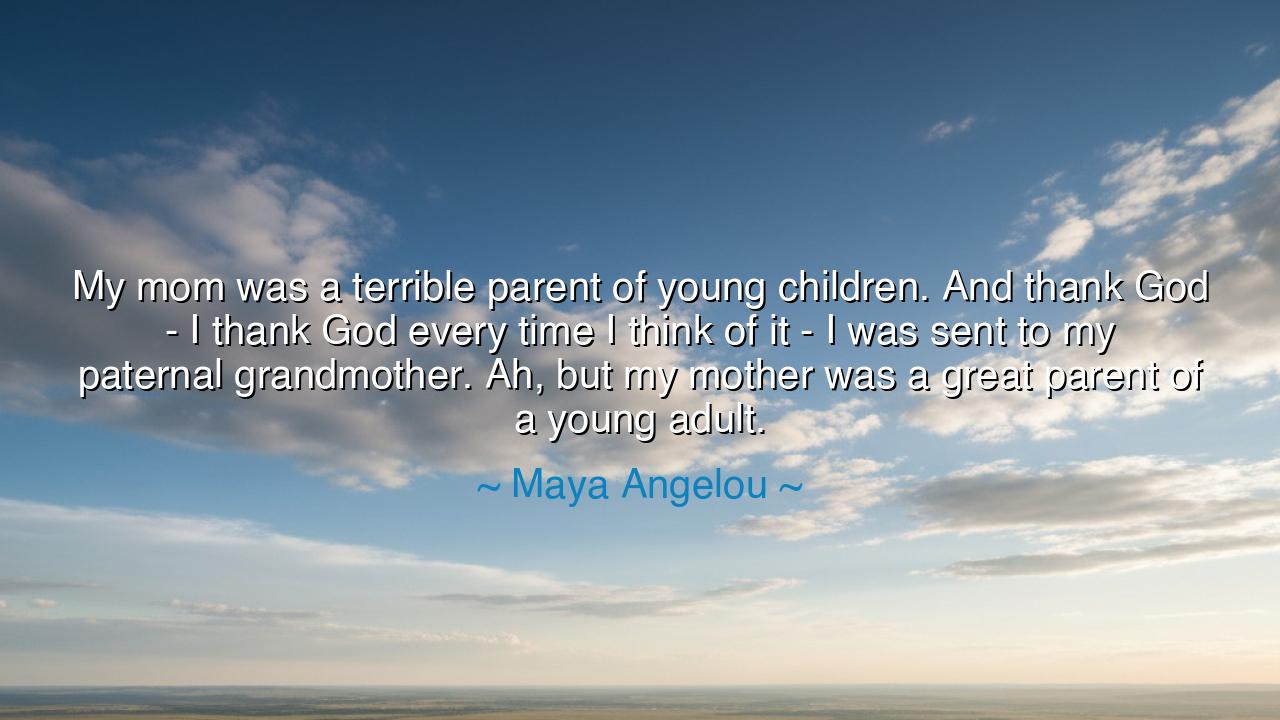
My mom was a terrible parent of young children. And thank God - I
My mom was a terrible parent of young children. And thank God - I thank God every time I think of it - I was sent to my paternal grandmother. Ah, but my mother was a great parent of a young adult.






The great poet and truth-teller Maya Angelou, whose words carry the weight of generations, once said: “My mom was a terrible parent of young children. And thank God – I thank God every time I think of it – I was sent to my paternal grandmother. Ah, but my mother was a great parent of a young adult.” In this confession, we find not bitterness but forgiveness, not rejection but understanding. It is a reflection of life’s deep and unpredictable rhythm—how people can fail us in one season, yet redeem themselves in another. Angelou’s words remind us that growth is not confined to youth; even those who falter may rise to greatness when time grants them wisdom.
The origin of this quote lies in Angelou’s own life, a life marked by hardship, resilience, and luminous self-discovery. Born in the segregated American South, she faced abandonment, abuse, and silence. When her mother, Vivian Baxter, proved unfit to raise her as a young child, Maya was sent to live with her grandmother, who became the pillar of her early years. The grandmother’s hands taught her strength; her faith instilled dignity; her steadiness became the foundation upon which Angelou built her soul. Yet later, as a grown woman finding her voice, Maya came to see her mother anew—not as the woman who failed her childhood, but as the one who empowered her adulthood. Here, the poet’s heart reveals a sacred truth: that redemption often arrives later than love first hoped.
In her words lives a rare wisdom—the acknowledgment that people, even those who gave us life, are imperfect instruments of love. Many parents, like Vivian Baxter, cannot nurture the fragile light of childhood; yet when their children stand tall in the world, they find their strength reflected back at them and learn to love with greater courage. Angelou’s forgiveness is not naïve; it is an act of grace. She accepts the past for what it was, without denying the pain, and honors the transformation that followed. In this way, her quote becomes a prayer for compassion—not only for our parents, but for all who stumble through the divine trial of being human.
Consider the story of Marcus Aurelius, the philosopher-king of Rome. In his Meditations, he writes of how each person he encountered taught him something different—one patience, another duty, another kindness. Yet even those who failed him, he said, were teachers of what not to do. Like Angelou, Aurelius understood that growth is not uniform; that one person can be unwise in one part of life and profoundly wise in another. Thus, to condemn someone forever for their failures is to deny the ever-turning nature of the human spirit.
Angelou’s gratitude toward her grandmother and later respect for her mother reflects a cycle that every soul must learn to embrace: that we are all shaped by both nurture and neglect, by love and its absence. Her childhood pain carved a hollow deep enough to hold the vastness of empathy. And when her mother reentered her life, their reunion was not the return of the lost, but the meeting of equals—two women who had both learned, both changed, both survived. The mother’s strength, once wild and misplaced, had matured into the guidance of a woman who had faced her own shadows. In that, Angelou found healing.
From this truth springs a lesson for all who walk the path of forgiveness: judge not the tree by the fruit of one season. Some hearts bloom late. Some souls awaken only after they have fallen. The mother who fails the child may yet become the friend who lifts the grown soul toward greatness. Therefore, we must learn to leave space in our hearts for the possibility of transformation—in others and in ourselves.
To the listener of this wisdom, Angelou’s message is both balm and challenge. If your parent, or your past, or your own heart has wounded you, do not believe that pain is the final chapter. Seek not perfection in love, but evolution. Understand that love, like the seasons, changes its form but not its essence. You may find one day that the person who once could not care for you in your youth becomes your companion in wisdom, your mirror in strength.
So remember, as Maya Angelou did: time is the great redeemer. Be grateful for the hands that raised you, even if they trembled. Be open to those who once failed you, for they may yet bring you gifts you never expected. And when you look back on the mosaic of your life, see not only the cracks, but the light that shines through them—for that light, born of brokenness, is the truest mark of love fulfilled.






AAdministratorAdministrator
Welcome, honored guests. Please leave a comment, we will respond soon